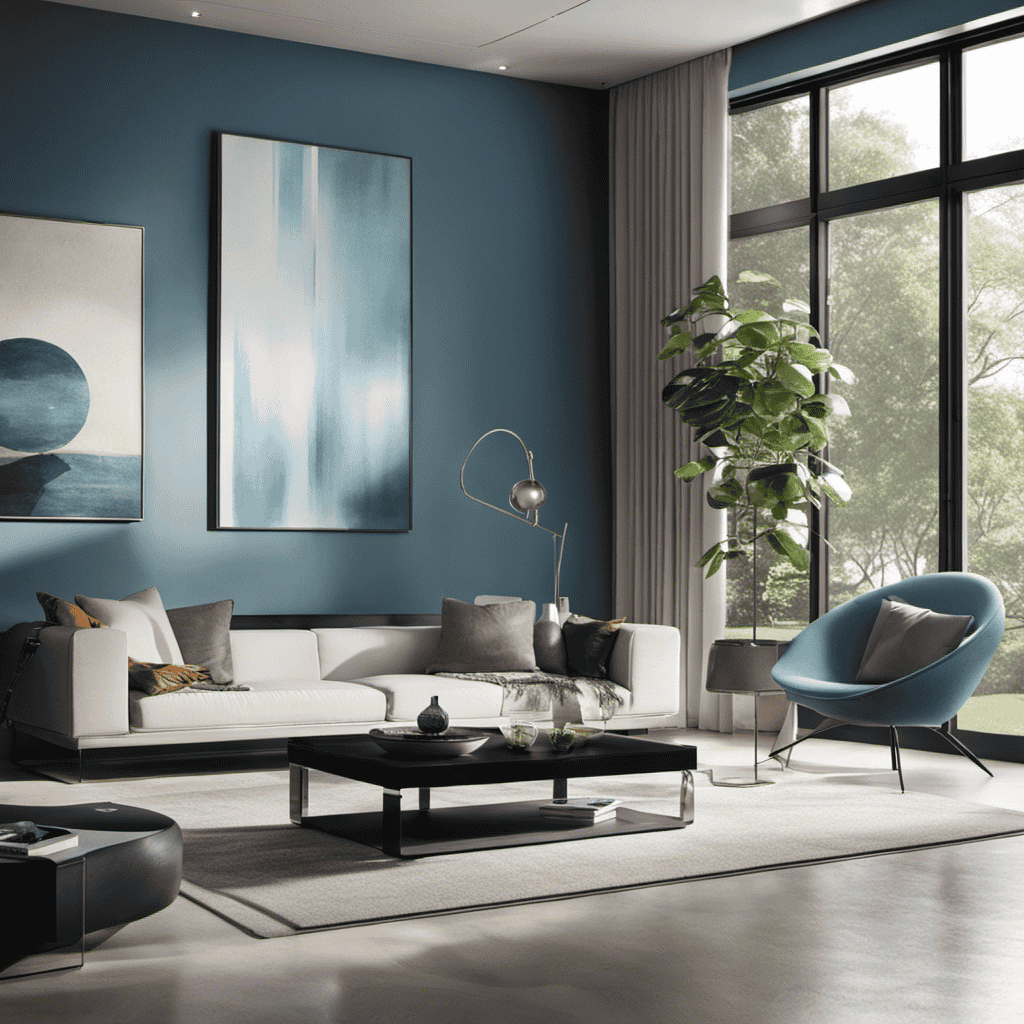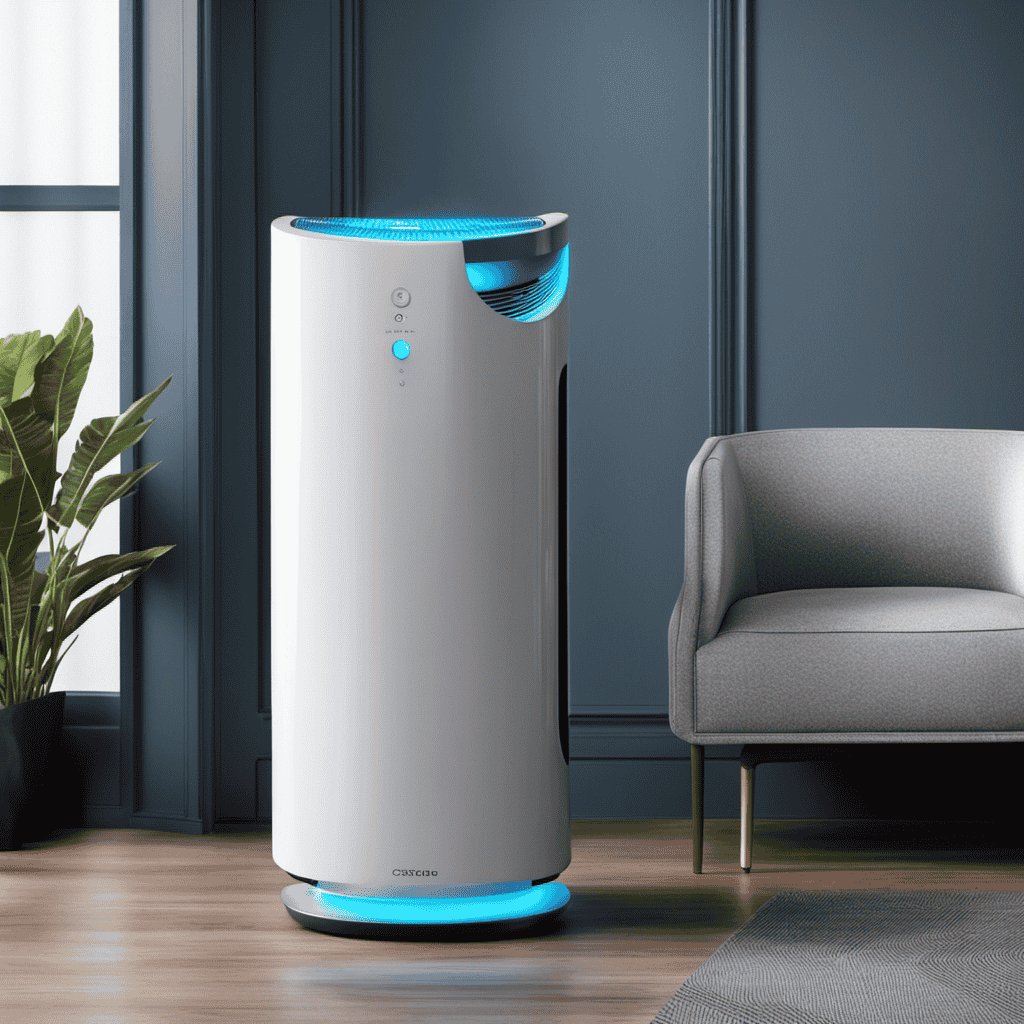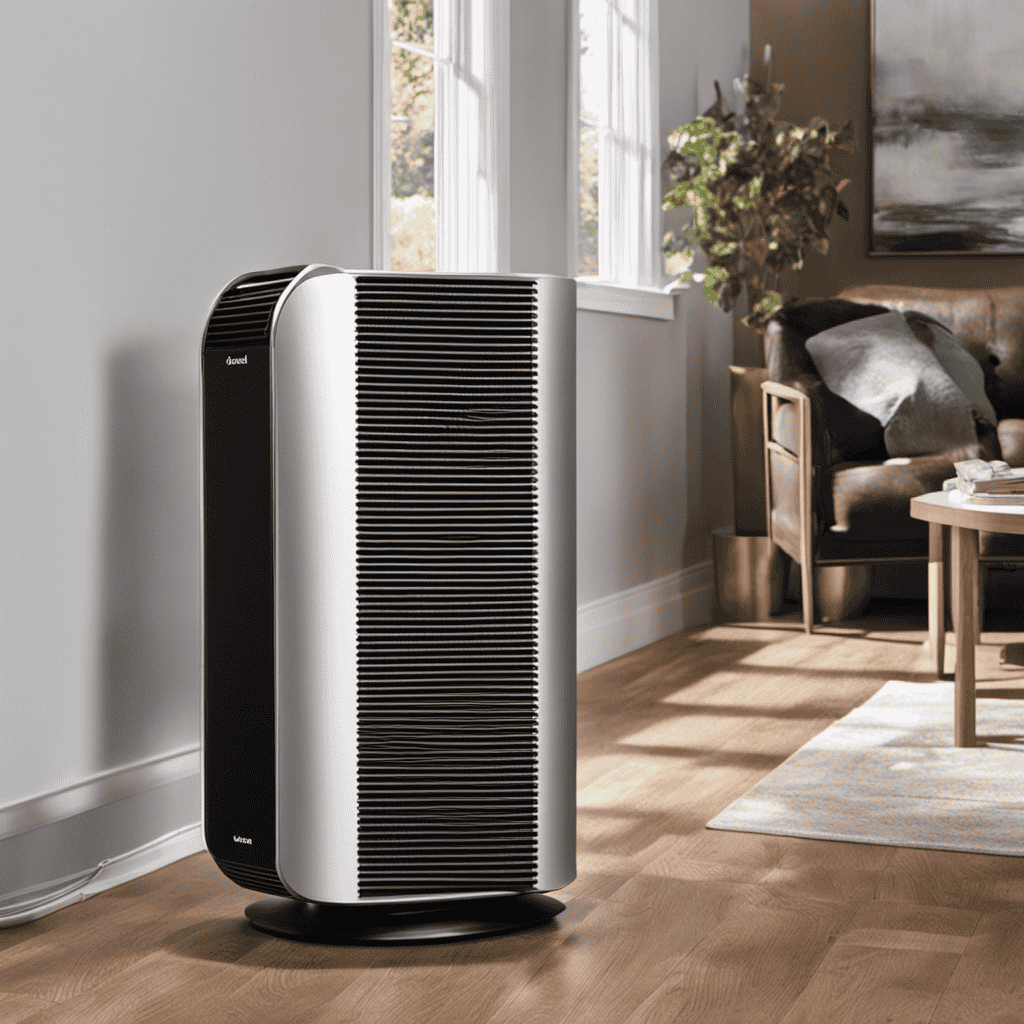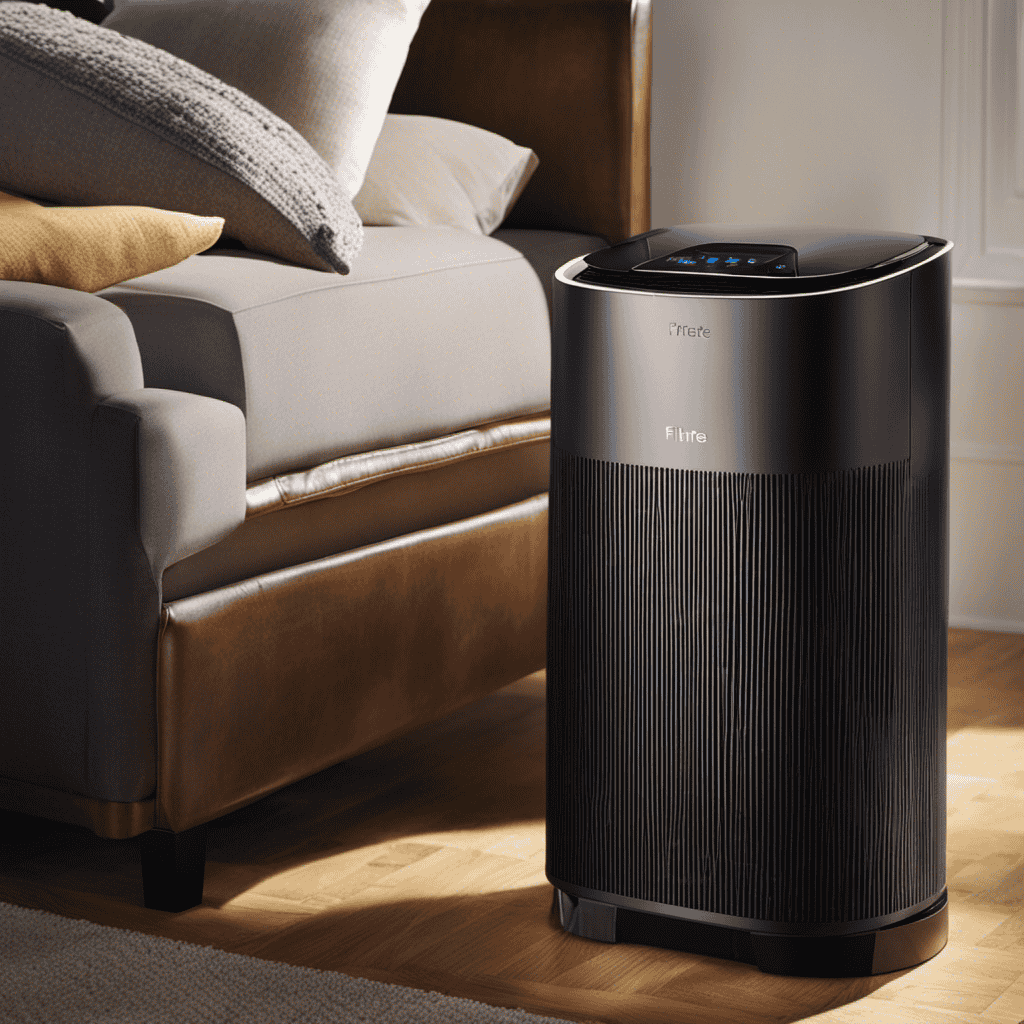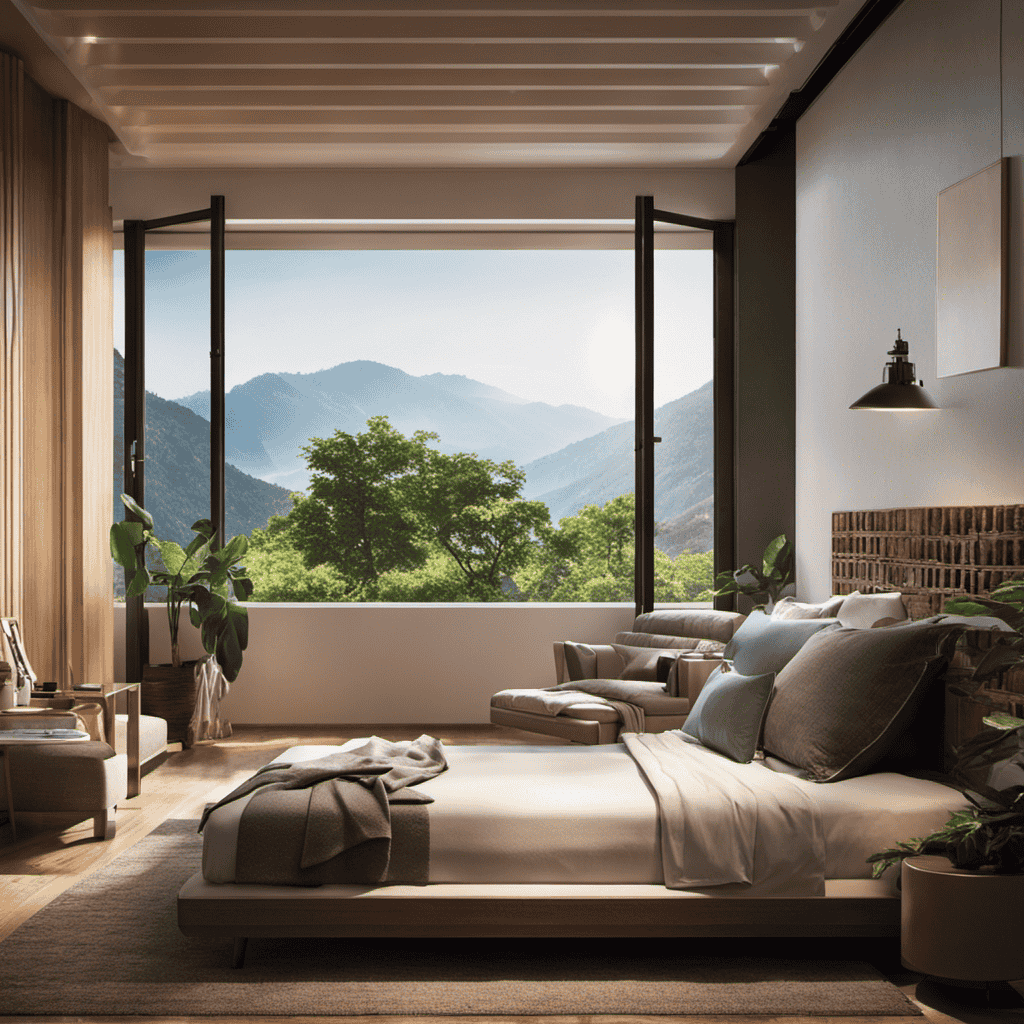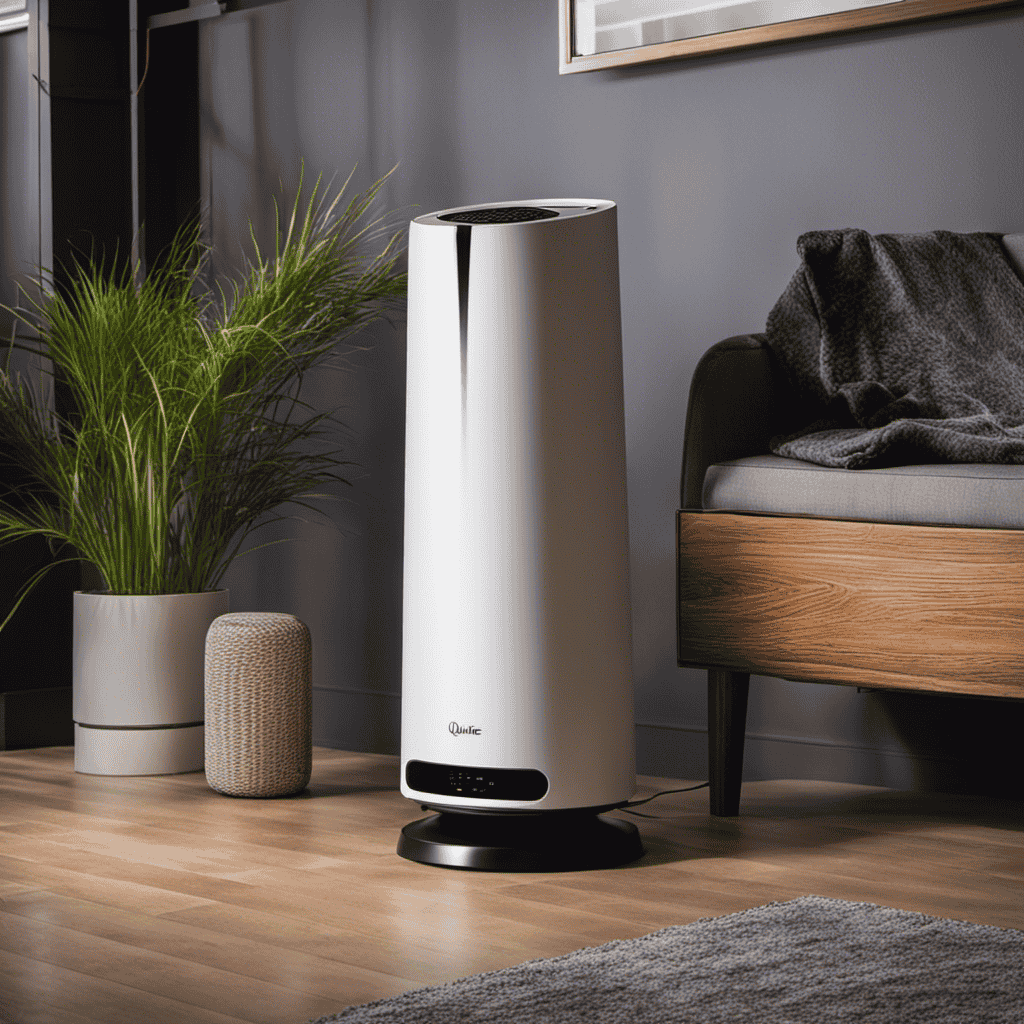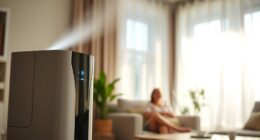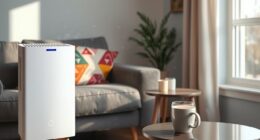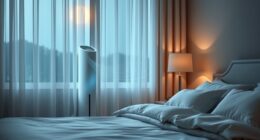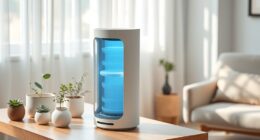What Is the Top Rated Air Purifier
As an individual who appreciates clean, fresh air, uncovering the best air purifier feels like encountering a refreshing breeze of mountain air on a summer morning.
With so many options available, it’s important to understand the features that make a purifier stand out.
In this article, I will guide you through the ins and outs of air purifiers, from their importance in maintaining air quality to the factors to consider when choosing one.
Let’s dive in and find the perfect purifier for your needs.
Key Takeaways
- Indoor air pollution can have serious health consequences, making the use of air purifiers important.
- HEPA filters, activated carbon filters, UV-C light technology, and ionization are effective methods used in air purifiers.
- When choosing an air purifier, consider factors such as filter type effectiveness, room size compatibility, noise level, and reputable brands.
- HEPA filters are highly effective in removing particles, activated carbon filters are excellent at eliminating odors and gases, and UV-C light filters kill bacteria and viruses.
Features to Look for in a Top Rated Air Purifier
When looking for a top-rated air purifier, you should focus on features like HEPA filters and automatic shut-off.
HEPA filters are essential for removing microscopic particles from the air, such as dust, pollen, and pet dander. They are highly effective in improving indoor air quality and reducing allergies and asthma symptoms.
Automatic shut-off is another important feature to consider. It allows the air purifier to automatically turn off when the desired level of air purification is achieved, saving energy and extending the lifespan of the device.
When researching different air purifier brands, you will come across a wide range of pricing options. It’s important to consider your budget and choose a model that best fits your needs without compromising on quality.
Understanding the Importance of Air Quality
Understanding the importance of clean air is crucial for maintaining a healthy living environment. Air pollution effects can have serious consequences on our health, both indoors and outdoors.
Indoor air pollutants, such as dust, pet dander, and volatile organic compounds (VOCs), can lead to respiratory problems, allergies, and even long-term health issues. These pollutants can come from various sources, including cleaning products, furniture, and building materials.
It is important to be aware of these potential sources and take steps to minimize their impact on indoor air quality. This can be achieved through proper ventilation, regular cleaning, and the use of air purifiers.
How Air Purifiers Work
Air purifiers work by filtering out harmful particles and pollutants from the air, improving the overall air quality in your home. Here’s how they do it:
-
HEPA filtration: High-Efficiency Particulate Air (HEPA) filters are the most common type of filter used in air purifiers. They can trap particles as small as 0.3 microns, including dust, pollen, pet dander, and even some bacteria and viruses.
-
Activated carbon filtration: This type of filter is effective at removing odors, gases, and volatile organic compounds (VOCs). Activated carbon has a porous structure that can absorb these chemicals, leaving the air smelling fresh and clean.
-
UV-C light technology: Some air purifiers use ultraviolet (UV) light to kill bacteria, viruses, and other microorganisms. UV-C light damages the DNA of these pathogens, rendering them unable to reproduce and causing them to die off.
-
Ionization: Ionizers release negatively charged ions into the air, which attach to positively charged particles like dust and allergens. This makes the particles heavier and causes them to settle out of the air, reducing the overall particle count.
With advancements in air purifier technology, these devices have become more effective than ever at improving indoor air quality. So, if you’re looking to breathe cleaner, healthier air at home, consider investing in an air purifier.
Factors to Consider When Choosing an Air Purifier
When it comes to choosing an air purifier, there are several important factors to consider.
One of the most crucial factors is the filter type effectiveness. Different air purifiers use different types of filters, such as HEPA or activated carbon filters, which vary in their ability to capture and remove contaminants from the air.
Additionally, room size compatibility is an important consideration as air purifiers have different coverage areas, and it’s essential to choose one that can effectively purify the air in your specific room or space.
Lastly, noise level considerations are crucial, especially if you plan to use the air purifier in your bedroom or office, where excessive noise can be disruptive.
Filter Type Effectiveness
To determine the top-rated air purifier, you should consider the effectiveness of different filter types. The filter type plays a crucial role in removing pollutants and allergens from the air.
Here are the four most common filter types and their effectiveness:
-
HEPA (High-Efficiency Particulate Air) filters: These filters are highly effective in removing particles as small as 0.3 microns, including dust, pollen, pet dander, and mold spores.
-
Activated carbon filters: These filters are excellent at eliminating odors, gases, and chemicals from the air. They are especially useful for homes with smokers or strong cooking smells.
-
UV-C light filters: These filters use ultraviolet light to kill bacteria, viruses, and other microorganisms. They are effective in preventing the spread of germs and improving indoor air quality.
-
Ionizers: These filters release negative ions into the air, which attach to positively charged particles like dust and allergens, making them easier to trap in the filter.
Considering the effectiveness of these different filter types will help you choose the top-rated air purifier that suits your needs.
It’s important to note that air purifiers come in a wide price range, so make sure to consider your budget as well. When researching the best air purifier brands, look for reputable companies with positive customer reviews and a history of producing high-quality products.
Room Size Compatibility
In my research on air purifiers, I’ve come across various brands that offer a range of options to suit different needs and budgets. Some of the top-rated brands in the market include Dyson, Honeywell, Coway, and Blueair. These brands are known for their quality, efficiency, and reliability in purifying the air.
Now, let’s talk about the price range of air purifiers. The cost of air purifiers can vary greatly depending on the brand, features, and room size compatibility. Generally, you can find air purifiers ranging from around $50 to several hundred dollars. The more advanced models with additional features like HEPA filters, smart technology, and larger coverage areas tend to be on the higher end of the price spectrum.
When choosing an air purifier, it’s important to consider not only the price but also the specific needs of your room size. Different air purifiers are designed to accommodate different room sizes, so make sure to check the manufacturer’s recommendations to ensure optimal performance.
Noise Level Considerations
Consider the noise level of different brands before purchasing an air purifier, as some models may produce louder sounds than others. A noisy air purifier can be distracting and disrupt your peace of mind. To ensure a silent operation, look for air purifiers that utilize noise reduction techniques. Here are some key features to consider when evaluating the noise level of an air purifier:
-
Noise Levels: Check the decibel rating of the air purifier. Look for models that operate at a low decibel level, typically below 50 dB, for a quiet and peaceful environment.
-
Fan Speeds: Some air purifiers offer multiple fan speed options. Lower fan speeds tend to produce less noise, while higher speeds may be noisier but provide faster air purification.
-
Design and Construction: Look for air purifiers with soundproofing materials or insulated chambers to reduce noise levels. Additionally, models with aerodynamic designs can help minimize airflow noise.
-
Customer Reviews: Read reviews from other customers to get a sense of the noise level experienced with different air purifier models. Real-life experiences can be valuable in determining the actual noise level of a particular brand.
HEPA Filters: The Gold Standard in Air Purification
When it comes to air purification, HEPA filters are the gold standard. These filters are highly effective at removing particles as small as 0.3 microns, including allergens, dust, and pet dander.
The benefits of using HEPA filters are numerous, from improving indoor air quality to reducing allergy symptoms.
While there are other air purification methods available, such as activated carbon filters and UV germicidal lamps, none can match the effectiveness and reliability of HEPA filters.
HEPA Filter Effectiveness
You’ll be pleased to know that HEPA filters are highly effective in removing 99.97% of airborne particles. Here’s why HEPA filters are the gold standard in air purification:
-
Air Purifier Brands: Many top-rated air purifier brands, such as Dyson, Honeywell, and Coway, utilize HEPA filters in their products. These brands have a reputation for producing high-quality air purifiers that effectively remove allergens and pollutants from the air.
-
Cost Comparison: While HEPA air purifiers may have a higher upfront cost compared to other types of filters, they offer long-term savings. HEPA filters have a longer lifespan and require less frequent replacement, reducing maintenance costs in the long run.
-
Advanced Filtration Technology: HEPA filters are made of a dense network of fibers that trap microscopic particles as small as 0.3 microns. This includes dust mites, pollen, pet dander, and even bacteria and viruses.
-
Verified Performance: HEPA filters undergo rigorous testing to meet industry standards. Look for air purifiers that are independently tested and certified to ensure their effectiveness in removing airborne particles.
Overall, HEPA filters provide superior air purification, making them an excellent choice for people looking to improve indoor air quality and reduce respiratory issues.
Benefits of HEPA Filters
If you suffer from allergies or respiratory issues, having a HEPA filter in your home can greatly improve the air quality. HEPA stands for High Efficiency Particulate Air, and these filters are designed to trap tiny particles such as pollen, pet dander, and dust mites.
One of the advantages of HEPA filters is their ability to remove up to 99.97% of airborne particles as small as 0.3 microns. This means that they can effectively remove common allergens and pollutants from the air, reducing the risk of respiratory symptoms and improving overall health.
Another advantage of HEPA filters is that they are suitable for all types of air purifiers, including portable units and whole-house systems. This means that you can enjoy clean and fresh air in any room of your home.
Other Air Purification Methods
To improve the air quality in your home, consider exploring alternative methods of air purification. While HEPA filters are highly effective, there are other options available that may better suit your needs. Here are four alternative air purification methods to consider:
-
Activated Carbon Filters: These filters are excellent at removing odors, chemicals, and volatile organic compounds (VOCs) from the air. They work by adsorbing these pollutants onto a porous carbon surface.
-
UV-C Sterilization: This method uses ultraviolet light to kill bacteria, viruses, and mold spores in the air. It is particularly useful in preventing the spread of airborne diseases.
-
Ionic Air Purifiers: These purifiers emit negatively charged ions into the air, which attach to airborne particles and cause them to fall to the ground. However, they may produce ozone as a byproduct, which can be harmful in high concentrations.
-
Ozone Generators: These devices release ozone into the air, which can neutralize odors and kill bacteria. However, ozone can be harmful to humans and pets, so caution must be exercised when using them.
The Role of Activated Carbon Filters in Air Purifiers
Activated carbon filters are effective at removing odors and harmful gases from the air. These filters work by adsorption, a process in which the carbon granules attract and trap the unwanted particles.
When air passes through the filter, the activated carbon captures volatile organic compounds (VOCs), chemicals, and other pollutants, leaving the air cleaner and healthier to breathe. This makes activated carbon filters an essential component of air purifiers, enhancing their effectiveness in improving indoor air quality.
Not only do they eliminate unpleasant smells, but they also help reduce the risk of respiratory problems caused by airborne toxins. By removing harmful gases and odors, activated carbon filters contribute to creating a more comfortable and safer living environment.
The Benefits of UV-C Technology in Air Purification
UV-C technology has revolutionized the way we clean and purify the air in our homes and workplaces. By using ultraviolet light, UV-C technology is able to effectively kill bacteria, viruses, and other harmful pathogens that may be present in the air.
Not only does this result in cleaner air, but it also provides numerous health benefits by reducing the risk of respiratory illnesses and allergies caused by these microorganisms.
UV-C for Cleaner Air
Using UV-C light can effectively kill bacteria and viruses in the air, making it a popular choice for cleaner air.
Here are some key reasons why UV-C technology is beneficial for air purification:
-
Powerful disinfection: UV-C light has the ability to penetrate the genetic material of microorganisms, disrupting their DNA and rendering them unable to reproduce or cause harm.
-
Chemical-free solution: Unlike other air purifying methods that rely on chemicals or filters, UV-C technology offers a chemical-free solution, eliminating the need for ongoing maintenance or replacement costs.
-
Wide coverage: UV-C light can effectively sanitize large areas, making it suitable for use in various environments such as homes, offices, hospitals, and public spaces.
-
Improved indoor air quality: By eliminating harmful bacteria and viruses from the air, UV-C technology helps to improve indoor air quality, reducing the risk of respiratory illnesses and allergies.
Overall, UV-C technology offers significant health benefits by providing cleaner, safer air for everyone.
Health Benefits of UV-C
When considering cleaner air for your home or office, it’s important to understand the health benefits of UV-C technology.
UV-C, also known as ultraviolet C, is a type of ultraviolet light that has been proven to effectively kill germs and bacteria. In healthcare settings, UV-C is used to disinfect surfaces and equipment, reducing the spread of infections. UV-C is also used in water purification systems, as it can destroy harmful microorganisms and pathogens.
By incorporating UV-C technology into air purifiers, you can ensure that the air you breathe is free from harmful contaminants. Not only does this promote a healthier environment, but it can also reduce the risk of respiratory illnesses.
Transitioning into the next section, it’s also important to consider the noise levels of air purifiers to find a balance between clean air and a peaceful living or working space.
Noise Levels of Air Purifiers: Finding a Balance
Finding a balance between noise levels and performance is crucial when choosing the top-rated air purifier. Noise reduction is an important factor to consider, especially if you plan on using the air purifier in your bedroom or office. Here are four key tips for managing air purifier noise levels:
-
Look for a noise reduction feature: Some air purifiers come with a specific setting that reduces noise levels during operation.
-
Opt for a larger model: Larger air purifiers tend to have more space for soundproofing materials, resulting in quieter operation.
-
Check the decibel rating: Look for air purifiers with a lower decibel rating, as this indicates quieter operation.
-
Consider placement: Placing the air purifier away from walls and furniture can help reduce noise reflection and make it quieter.
Energy Efficiency: Saving Money and the Environment
To save money and reduce your environmental impact, make sure to choose an energy-efficient model for your air purification needs.
Energy-efficient air purifiers are designed to use less electricity while still effectively cleaning the air in your home. These models typically have high-quality filters that can capture a wide range of pollutants, such as dust, pollen, pet dander, and smoke.
By opting for an energy-efficient air purifier, you can lower your energy bills and minimize your carbon footprint. Look for models with the Energy Star certification, as they meet strict energy efficiency guidelines set by the Environmental Protection Agency.
Additionally, consider the size of the room you want to purify, as choosing the right size air purifier can further optimize energy usage and help you save even more money in the long run.
Air Purifier Maintenance and Filter Replacement
Make sure you regularly clean and replace the filters in your air purifier to maintain its efficiency and ensure clean air in your home. Here are some air purifier maintenance tips to help you extend the lifespan of your filters:
-
Vacuum the pre-filter: This removes large particles and debris, preventing them from clogging the main filter.
-
Wash or replace the HEPA filter: Depending on the manufacturer’s instructions, you can either wash or replace the HEPA filter to remove smaller particles like dust, pollen, and pet dander.
-
Clean the activated carbon filter: This filter absorbs odors and chemicals, so it’s important to clean it regularly to maintain its effectiveness.
-
Check the filter indicator: Many air purifiers have a filter indicator that alerts you when it’s time to clean or replace the filters.
By following these maintenance tips, you can extend the lifespan of your air purifier’s filters and ensure that it continues to provide you with clean and fresh air.
Now, let’s move on to discussing the top-rated air purifiers on the market today.
Top Rated Air Purifiers on the Market Today
One of the most popular options for clean and fresh indoor air is an air purifier. With so many air purifier brands on the market today, it can be overwhelming to choose the right one.
However, there are a few top-rated air purifiers that stand out from the rest. One of the top brands is Dyson, known for its innovative technology and sleek design. Another popular brand is Honeywell, offering a wide range of models at affordable prices. For those looking for a budget-friendly option, GermGuardian is a great choice, providing excellent air purification at a lower cost.
When considering air purifier prices, it’s important to also factor in the long-term costs of filter replacements. Overall, investing in a top-rated air purifier is a worthwhile decision for improving indoor air quality.
Frequently Asked Questions
What Is the Average Lifespan of a Top-Rated Air Purifier?
The average lifespan of a top-rated air purifier can vary depending on the model and maintenance requirements. Regularly changing the filters and cleaning the unit can help prolong its lifespan.
Can an Air Purifier Eliminate All Types of Odors?
Yes, an air purifier can eliminate smoke odors and reduce cooking odors. It works by filtering the air and trapping particles that cause these odors, leaving the air smelling fresh and clean.
Are Air Purifiers Effective in Reducing Pet Dander and Allergens?
Air purifiers are effective in reducing pet dander and allergens. Regular air purifier maintenance is important to maintain their effectiveness. For pet owners, the best air purifiers are those specifically designed to tackle pet-related allergens.
Can an Air Purifier Help With Respiratory Conditions Such as Asthma or Allergies?
Yes, an air purifier can greatly help with respiratory conditions like asthma and allergies. It uses advanced technology to filter and remove airborne pollutants, providing cleaner air for easier breathing and reducing symptoms.
How Often Should the Filters Be Replaced in a Top-Rated Air Purifier?
Filters in top-rated air purifiers should be replaced regularly to maintain optimal performance. The frequency of filter replacement depends on factors such as usage and air quality. It’s important to consider the maintenance cost when selecting an air purifier.
Conclusion
In conclusion, after extensive research and analysis, it is clear that when it comes to air purifiers, the top rated ones are those that excel in all aspects. From the efficiency of their HEPA filters to their energy-saving capabilities, these purifiers ensure that you breathe clean and fresh air.
With a wide range of options available in the market, it is essential to consider your specific needs and preferences. So, don’t compromise on your health and invest in a top rated air purifier today.
Remember, clean air is a precious commodity and should not be taken for granted.
